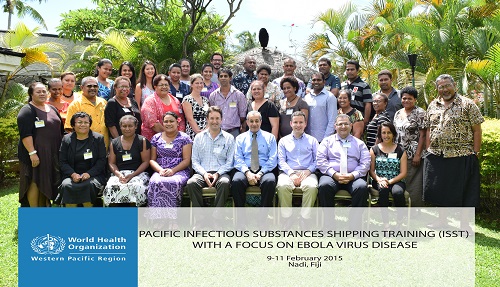Laboratory services are part of every phase of alert and response, including detection, investigation and response. In order to assure the reliable and timely laboratory identification of infectious agents and other hazards - including Ebola Virus Disease (EVD) - countries need to be able to safely ship specimens to the appropriate laboratories for analysis.
Pacific preparation for public health threats
The International Health Regulations (2005) are a legally-binding agreement to help the international community identify and respond to acute public health threats including pandemics and other serious disease outbreaks. When implemented, the IHR will improve the capacity of all countries to detect, assess, notify and respond to public health threats.
Within the IHR framework, WHO has called on all countries, including Pacific island countries and areas (PICs), to enhance their capacities to respond to Ebola, in the unlikely event that the virus is imported into the Pacific. Although the risk of Ebola spreading to the Pacific region remains low, the consequences and impact could be severe.
A regional survey carried out in 2014 revealed that many laboratory staff in the PICs lacked the required certification to ship infectious substances, one of the core requirements under the IHR. In light of the Ebola Virus Disease (EVD) outbreak in West Africa, an Infectious Substances Shipping Training (ISST) was organised in Nadi, Fiji in February, 2015.
Certification in shipping infectious substances
The ISST was organized by the WHO Office for South Pacific/Division of Pacific Technical Support in collaboration with the Regional Office for the Western Pacific and the WHO Headquarters/Geneva. The Victorian Infectious Disease Reference Laboratory (VIDRL), Secretariat of the Pacific Community (SPC), Pacific Island Health Officers' Association (PIHOA) and Pacific Paramedical Training Centre (PPTC) were collaborating partners to the training and provided experts as trainers and facilitators.
During the training, the participants from 12 PICS:
- learned principles and practice of shipping infectious substances in compliance with international transport regulations;
- became familiar with infection prevention and control guidelines for handling and disposal of highly infectious materials; and
- mapped regional referral support services for laboratory diagnosis of emerging infectious diseases (EIDs), including Ebola virus.
At the end of the training, participants from all 12 PICs received certification against international transport regulations which are recognised by International Air Transport Association and International Civil Aviation Organization, based upon successful completion of the practical and written examination.
Dr Liu, WHO Regional Office for Western Pacific’s Director of Pacific Technical Support/WHO Representative highlighted that “this training will further strengthen the ability of the Pacific island nations to rapidly identify and respond to serious emerging and pandemic disease threats.”
Certificates are valid for 2 years and to ensure sustainable renewal of the certification, participants who successfully completed the face-to-face ISST training will be offered a web-based refresher course available in English.


/59748.tmb-300v.png?sfvrsn=9885965b_2)


